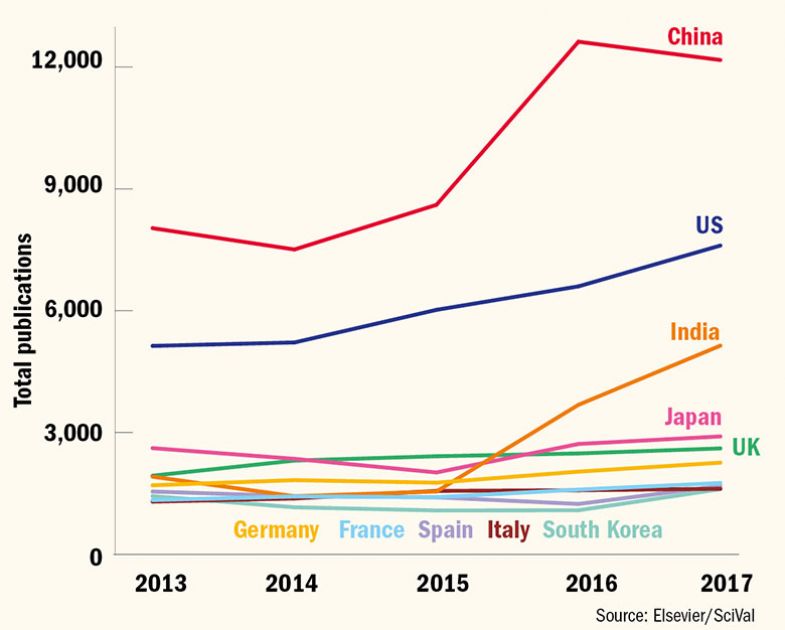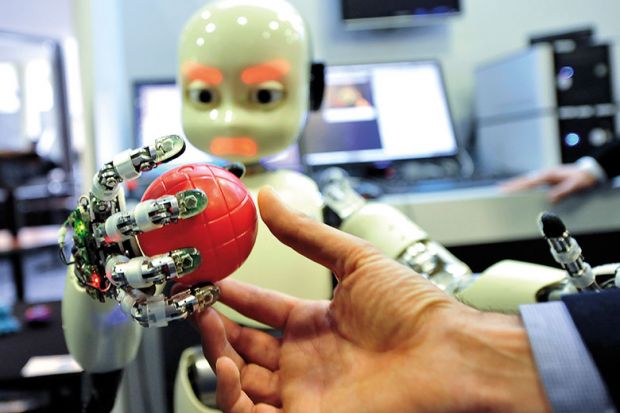Dame Wendy Hall, Regius professor of computer science at the University of Southampton, said that the strength of UK research in the field meant that the European Union could ill afford not to strike a deal on collaboration with UK universities.
She argued that a common goal of developing ethical practices in both research into and the application of AI technologies would give the UK and Europe a “high ground” and position them well to compete with the US and China.
“There’s a whole hype-wave around AI right now and every government in the world wants to get the best of it,” said Dame Wendy, who was commissioned by the government to conduct a review of the UK’s policies on AI last year. “[Anyone] not in a position to seize those opportunities and develop [their] own AI sector becomes dependent on the US or China. So it’s very important that we build on our fantastic 50-year legacy of British AI research.”
The debate comes amid continuing uncertainty about British-based researchers’ access to EU funds after the UK’s departure from the bloc next March.
A European Commission report published on 25 April called for a Europe-wide cash injection of €20 billion (£17.6 billion) into AI research in the run-up to 2020, with the commission promising an additional €1.5 billion via its Horizon 2020 programme.
Without such funds, the EU “risks losing out on the opportunities offered by AI, facing a brain drain” and being left as “a consumer of solutions” developed by US and Asian competitors, the report says.
A UK government policy paper published on the same day confirmed a £1 billion investment in the sector, following a series of recommendations outlined in the AI industry review led by Dame Wendy and Jérôme Pesenti, now vice-president of artificial intelligence at Facebook, last year. It estimates that AI will bring an extra £630 billion to the UK economy alone by 2035.
Dame Wendy said that she was optimistic that a deal could be struck to ensure continued collaboration between the UK and EU on AI research.
“We [the UK] will reach a call with Europe and in my view we will be part of Europe on this,” she said. “We will compete in terms of economics and industry and upward skills but that will be true for every country. This is global stuff we cannot do in silos. On the important issues such as ethics and regulation, we will work together.”
Alongside access to research funding, ensuring the continued mobility of leading scholars is likely to be key to the success of the UK and the EU in AI research.
Nick Jennings, chair in artificial intelligence and vice-provost (research) at Imperial College London, said that his own university had given policymakers “a number of suggestions” as to how researchers working on Horizon 2020 projects could automatically obtain visas if required.
“I am optimistic that we will end up with some sensible outcome,” he said. “Europeans want us to stay involved, it’s clear we want to stay involved, so I should hope that it’s one of those less contentious areas.”
The need for a collaborative approach comes against a backdrop of booming AI industry development in China, where the government has pledged to create a $150 billion (£109 billion) sector by 2030.
Data from Elsevier’s SciVal database shows that Chinese research institutions now dominate global research output on AI, although the US private sector produces some of the highest quality papers. The UK still outperforms the rest of Europe in terms of research volume, however – in fifth place globally behind China, the US, India and Japan.
Sir Keith Burnett, vice-chancellor of the University of Sheffield, shifted the emphasis away from competition with China to highlight the importance of collaboration.
“China, with its vast population, sense of purpose and investment in technology could definitely be the future leader in innovation, but China with the UK in particular could be a world-beating combination,” Sir Keith said.
Sheffield has long been involved in such research partnerships with Chinese universities, and this month launched its flagship Chinese Future Lab initiative with Tsinghua University.
“The UK has a whole range of crucial companies such as DeepMind as well as research strengths such as the Alan Turing Institute, so we have a wonderful capability in AI. If you bring this together with Chinese investment and chutzpah, you are away,” Sir Keith said.
rachael.pells@timeshighereducation.com
I, robot: top 10 for AI research ouput

Artificial intelligence with real impact
A visit to Imperial College London leaves little doubt about the potential of advances in artificial intelligence technology – and the role that the UK and Europe could play in them.
Imperial boasts a network of 600 people working on issues relating to AI, extending across engineering, medicine, natural sciences and business studies.
Researchers collaborate on campus with companies such as Google DeepMind and Dyson, as well as firms vying to capitalise on the university’s drone and robotics technology.
Previous successful Imperial-led start-ups include Magic Pony, a programme that uses machine learning to create high-resolution film from grainy footage. The technology was sold to Twitter for $150 million (£109 million) in 2016.
In one laboratory, researchers are in the process of training computers to perceive the passing of time, predict sequences and remember occurrences to mimic the workings of the human brain. The team found that the computers could “dream” – memorising and contextualising what they had learned in the same way that humans do – and even suffer from boredom, with less dynamic image sequences causing the system to think that time had gone more slowly.
A similar machine-learning approach developed by Imperial’s brain and behaviour laboratory has drawn on driverless car technology to create an “intelligent” wheelchair that can be controlled by eye movement alone.
“The chair learns to anticipate where the user wants to go,” explained Aldo Faisal, a senior lecturer in neurotechnology. “We are coming to a very exciting time now in that we can combine AI with healthcare to deliver technology at a very low cost and give people the freedom to move again.”
As human reliance on machines grows, public attitudes towards AI will be key. Nick Jennings, chair in AI and vice-provost of research at Imperial, previously called for the mantra of “humans [as] the masters and technology the slaves” to change. But this bid has arguably taken a knock after recent headlines linked to Facebook data and Cambridge Analytica.
“I hope that public perceptions do change around data collection,” he said. “I want computers and scientists to be partners – smart AI can be very much a partner to us rather than just a tool that we instruct,” he explained.
As an example, Professor Jennings described how AI had been used to draw up plans of where to distribute aid parcels after natural disasters in Nepal.
“Sometimes the machine is in charge, sometimes the human is in charge and that can vary,” he continued. “We need to come to terms with the fact there are some things that humans are good at and others that machines will be better at.”
POSTSCRIPT:
Print headlines: Europe and UK urged to unite on AI despite Brexit and Androids are dreaming of electric sheep and feeling bored
Register to continue
Why register?
- Registration is free and only takes a moment
- Once registered, you can read 3 articles a month
- Sign up for our newsletter
Subscribe
Or subscribe for unlimited access to:
- Unlimited access to news, views, insights & reviews
- Digital editions
- Digital access to THE’s university and college rankings analysis
Already registered or a current subscriber? Login








